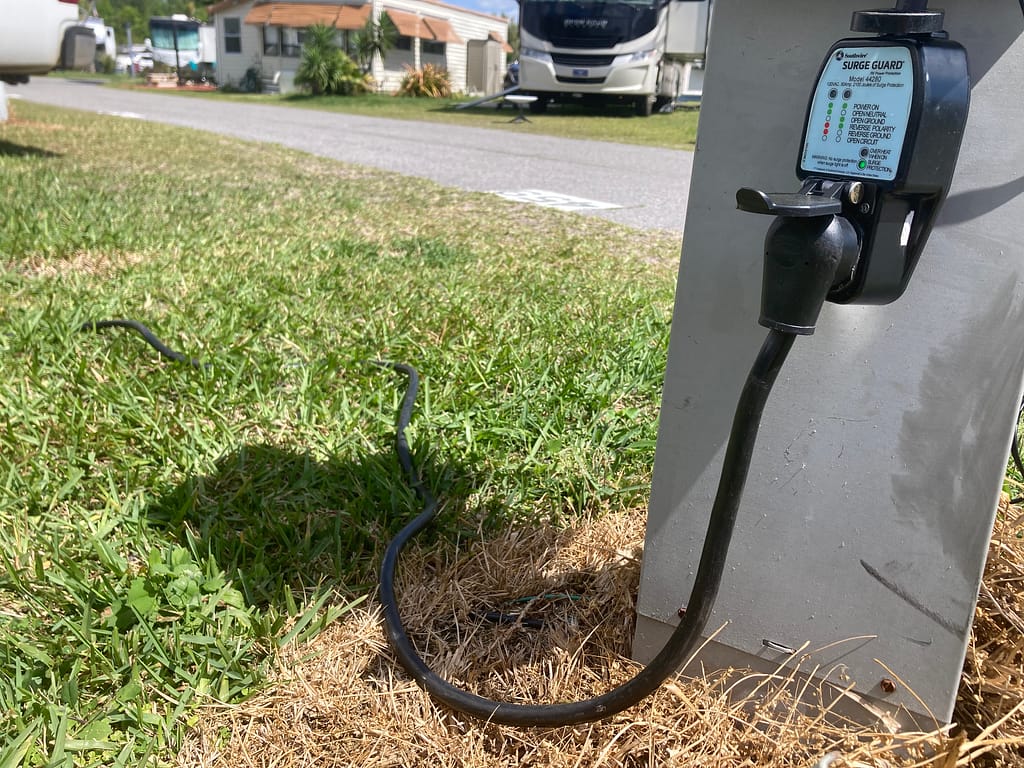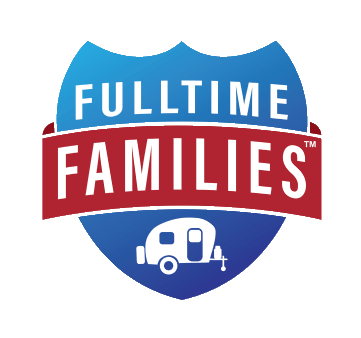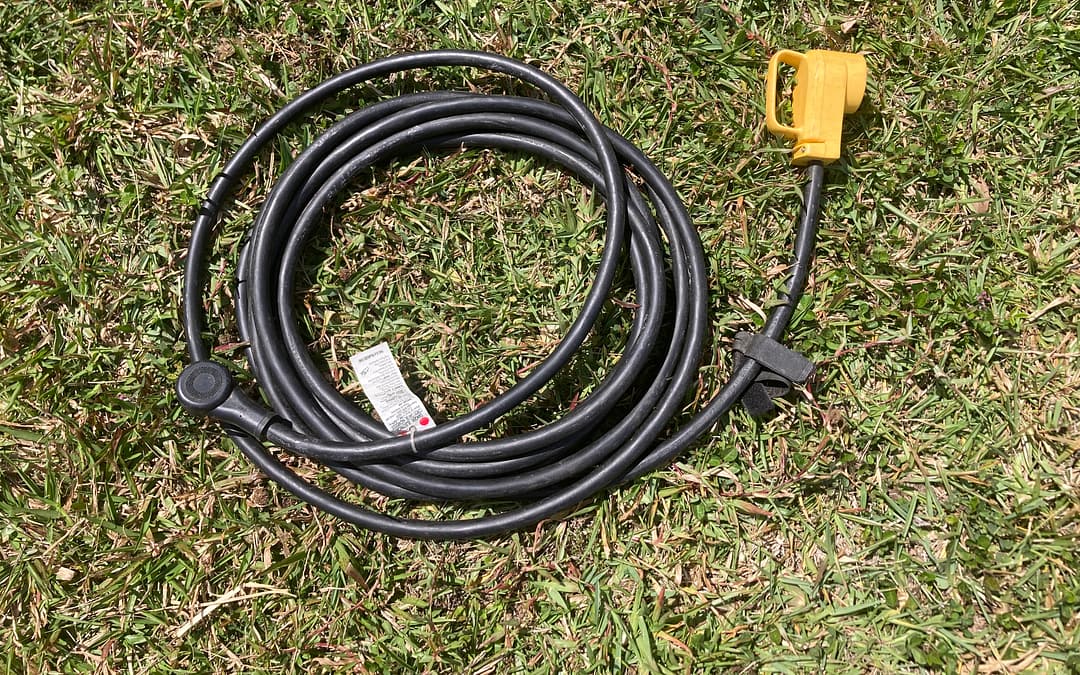This article may contain compensated links, please read our disclaimer for more information.
RV extension cords are like RV sewer hose supports—some people travel for years without one, but as soon as you need one, you really do need it. For this reason, we highly recommend adding an RV extension cord to your collection of RV accessories.
Why Buy RV Extension Cords?
Why would you ever need an RV extension cord, you ask? Well, sometimes campgrounds just aren’t very well laid out. We’ve been in plenty of campsites with power pedestals located yards away from the actual RV pad. If the cord that goes between your RV and the power hookup isn’t very long, this can pose a real problem.
Some people pull out their handy orange extension cords at this point. Those cords are meant for outdoor use, after all, so what could go wrong? Unfortunately, the answer is a lot can go wrong. The amount of electricity that needs to make its way from the electric hookup to your rig is much more than the typical extension cord is rated for. Because of this, a regular extension cord is likely to get hot, melt, and could even cause a fire if used to connect an RV to a power source.
The better option, obviously, is to invest in a heavy-duty RV extension cord. Yes, they are more expensive than a household extension cord, but RV extension cords are also made to carry the power your RV needs to function properly. When plugged in correctly, using a single RV extension cord is 100% safe and should work fine.
That said, plugging multiple cords into one another to create a long run won’t work. This is because long runs create voltage drops, which might mean certain appliances don’t work and could even damage appliances or electronics. If you need to move electricity across a long distance to your RV, you will need something larger than a typical RV extension cord in order to avoid these issues.
What to Look For in RV Extension Cords
Clearly, it’s pretty darn important to invest in an RV extension cord rather than relying on cords that aren’t rated for RV use. But how do you know which extension cord is best? Fortunately, there are a few things you can look for when shopping for an extension cord to make sure the one you buy will work for you.
Amperage
RV extension cords can be bought for both 30-amp and 50-amp RVs. Before buying a cord, make sure it is the correct amperage. This will determine whether or not the plug is compatible with your RV.
Length
Obviously, you’ll want to make sure the RV extension cord you buy is long enough for the use-case. Measure the amount of extra cord you need and go from there. Just remember that long runs are not the best option!
Durability
A durable cord that will last a long time is of course going to be your best bet. Read reviews and make sure the cord you buy is heavy-duty enough to withstand years of camping.

The Best RV Extension Cords
Our absolute favorite RV extension cords? The Camcorder Power Grip cords, which include a locking end to make sure everything stays in place exactly as it should. These cords come in both 30-amp and 50-amp versions, so you can choose the one that fits your setup.
The cords are available in lengths up to 50 feet, but we highly recommend using the shortest cord possible since longer runs come with extra risk factors. We appreciate that these cords are flexible, making them easy to use and store. We also love that there are handles on each end, making it easier to get a good (and safe) grip when plugging in or unplugging.
Tips for Using RV Extension Cords
Always Use a Surge Protector
You always, always want to use an RV surge protector when plugging your RV in at a campsite. This rule still applies when using an extension cord. Simply put the surge protector between the power pedestal and the extension cord and you should be good to go.
Invest in Adapters
Some campsites don’t offer both 50- and 30-amp service. In this case, you might need a “dog bone” adapter that allows you to plug your 50-amp rig into a 30-amp outlet or vice versa. We recommend investing in an adapter now so you aren’t caught unprepared.
Use the Correct Amperage
As mentioned above, it is important that you use an RV extension cord that can handle the amperage your rig is going to draw. Check the packaging before you buy to make sure you are purchasing a cord that matches your RV.
Use the Shortest Length Possible
We also mentioned the fact that longer runs of cable can produce voltage drops, which can be dangerous and damaging. For this reason, we recommend buying and using the shortest run of RV extension cord your situation allows. You’ll also want to avoid plugging cords into one another to create a longer run.
Avoid Leaving Extension Cords in Water
While RV extension cords are made to be used outside, you really don’t want to leave them out in heavy rain or allow them to be buried in snow. Instead, try to get the connection point up off the ground and protect it from the elements as much as you safely can.
Never Pull the Cord
It might be tempting to pull on the cord rather than the plug when it comes time to unplug and break camp. Don’t do this. Doing so can damage the wires inside of the extension cord. Not only will this mean buying a new extension cord sooner than you might otherwise, it could also create a dangerous situation if you don’t realize the wires are damaged and you still plug the damaged cord in.
Don’t Use Damaged Cords
Inspect your extension cord before use. If you see any damage whatsoever, avoid using the cord and opt to buy a new one instead. If only the head is damaged, it might be possible to replace the head, but you’ll want to make sure you know what you’re doing before attempting this job.
That’s pretty much all there is to know about RV extension cords. Hopefully this guide helps you better understand why you need an RV extension cord, as well as what to look for when buying one and how to use it once you get it to your campsite. Order now so you’re prepared!
Join Fulltime Families
Fulltime Families Members get access to the best resources, community and discounts.
Fulltime Families is a participant in the Amazon Services LLC Associates Program, an affiliate advertising program designed to provide a means for sites to earn advertising fees by advertising and linking to amazon.com, amazon.co.uk, amazon.ca. Amazon and the Amazon logo are trademarks of Amazon.com, Inc. or its affiliates.

